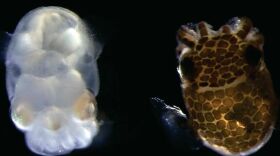
Jon Hamilton
Jon Hamilton is a correspondent for NPR's Science Desk. Currently he focuses on neuroscience and health risks.
In 2014, Hamilton went to Liberia as part of the NPR team that covered Ebola. The team received a Peabody Award for its coverage.
Following the 2011 earthquake and tsunami in Japan, Hamilton was part of NPR's team of science reporters and editors who went to Japan to cover the crisis at the Fukushima Dai-ichi nuclear power plant.
Hamilton contributed several pieces to the Science Desk series "The Human Edge," which looked at what makes people the most versatile and powerful species on Earth. His reporting explained how humans use stories, how the highly evolved human brain is made from primitive parts, and what autism reveals about humans' social brains.
In 2009, Hamilton received the Michael E. DeBakey Journalism Award for his piece on the neuroscience behind treating autism.
Before joining NPR in 1998, Hamilton was a media fellow with the Henry J. Kaiser Family Foundation studying health policy issues. He reported on states that have improved their Medicaid programs for the poor by enrolling beneficiaries in private HMOs.
From 1995-1997, Hamilton wrote on health and medical topics as a freelance writer, after having been a medical reporter for both The Commercial Appeal and Physician's Weekly.
Hamilton graduated with honors from Oberlin College in Ohio with a Bachelor of Arts in English. As a student, he was the editor of the Oberlin Review student newspaper. He earned his master's degree in journalism from Columbia University, where he graduated with honors. During his time at Columbia, Hamilton was awarded the Baker Prize for magazine writing and earned a Sherwood traveling fellowship.
-
People seek out art and music that combine sadness and beauty. Scientists and artists say there's good reason why we're drawn to it.
-
A see-through squid is giving scientists an unprecedented view of the brain and other organs in a living animal.
-
Two studies show how technology is allowing people to generate speech using only their thoughts.
-
Health, Science & EnvironmentA severe traumatic brain injury can make it hard to remember recent events or conversations. But a form of brain stimulation appears to ease this memory deficit.
-
In a large study, the experimental drug donanemab slowed the progression of Alzheimer's by about 35%. That's slightly better than the drug Leqembi, which was fully approved by the FDA on July 6.
-
The first drug found to slow the progression of Alzheimer's disease has been granted full approval by the Food and Drug Administration.
-
An obscure bit of brain tissue appears critical to both out-of-body experiences and our sense of being anchored to a physical self.
-
The Food and Drug Administration is expected to grant full approval to the Alzheimer's drug lecanemab by July 6. But access to the drug may still be limited.
-
Diseases like Alzheimer's and Parkinson's spread through the brain like a forest fire. A new study suggests how the fire starts.
-
Scientists have shown that deep brain stimulation during sleep can help people retain new information. The approach could help people with memory problems related to disorders like Alzheimer's.










